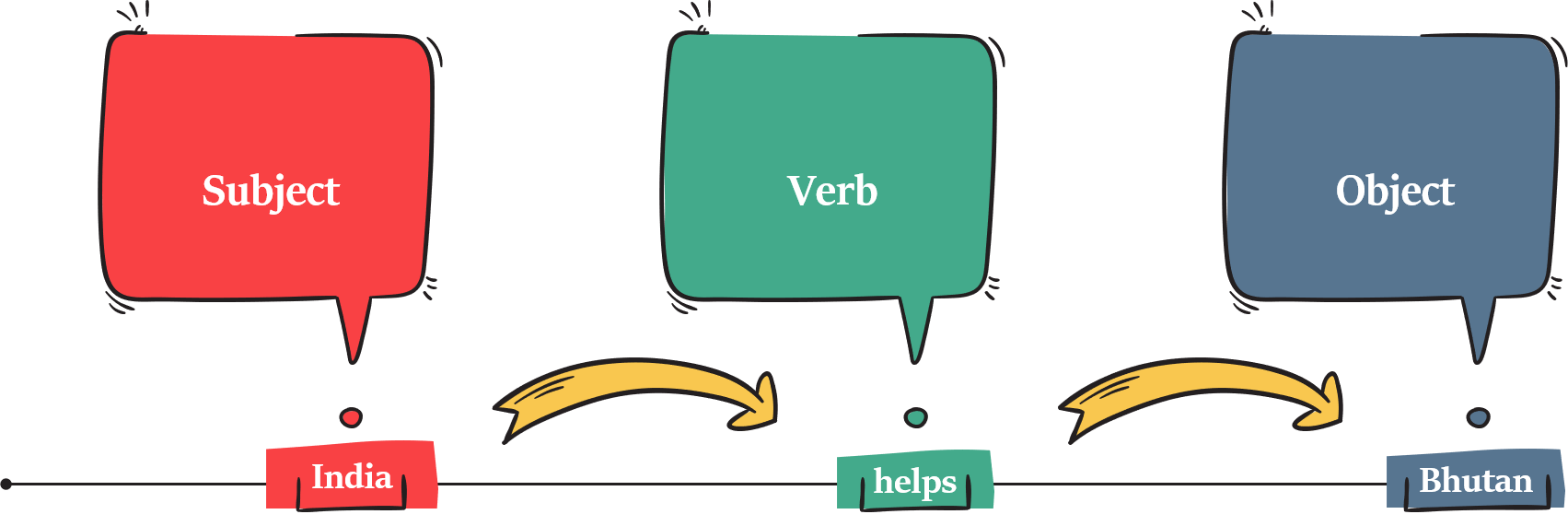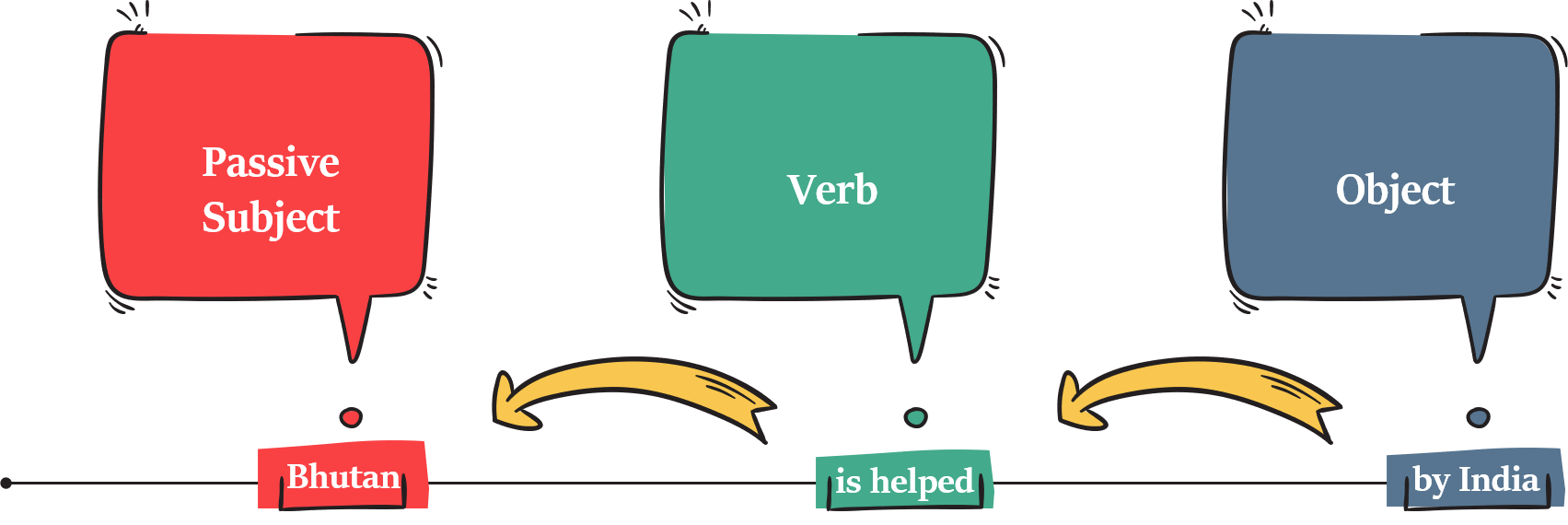Overview of Active-Passive voice
In English grammar, verbs have the following properties:
- Number - Singular, Plural
- Person - I, II, and III
- Tense - Past, Present
- Mood
- Voice - Active, Passive
In this module, we will focus on the Voice. However, to understand it better, a student must have some basic knowledge of Verbs and Tenses.
What is a Voice?
Voice - form of a Verb which shows whether Subject does something or has something done to it.
Types of Voices
Active Voice
If the form of the verb shows that Subject does something (subject is the doer of the action, it is active).
Active Voice Pattern: Subject + Verb + Object
India helps Bhutan. (Indian – subject; helps – verb; Bhutan - object)

Passive Voice
If the form of the verb shows that something is done to the Subject (subject receives some action, it is passive).
Passive Voice Pattern: Subject (passive) + Helping verb ‘be’ (according to Tense) +
Bhutan is helped by India. (Bhutan – passive subject; is – helping verb; helped –

So, to make Passive voice we use: be +
Let’s observe these two sentences again:
Active Voice: India helps Bhutan. (Indian – subject; helps – verb; Bhutan - object)
Passive voice: Bhutan is helped by India. (Bhutan – passive subject; is – helping verb; helped –
In passive voice, the subject of active voice becomes the object of preposition ‘by’. It is in objective case now and not in subjective case.
Similarly, in passive voice, the object of active voice becomes a passive subject. It is in subjective case now and not in objective case. The helping verb in passive voice will agree with the number and person of the passive subject.
In passive voice, the object of preposition ‘by’ is also called as the Doer (as it does the action).
Similarly, in passive voice, the passive subject is also called the Receiver (as subject of passive voice is passive, it receives the action).
So, we can also write the passive voice pattern as follows:
Passive Voice Pattern: Receiver + Helping verb ‘be’ (according to Tense) +
Bhutan is helped by India. (Bhutan – passive subject/receiver; is – helping verb; helped –
Receiver is also called as Patient, while Doer is also called as Agent.
‘by + object’ comes for
In the middle one or two words can come, but ‘by + object’ should not be very far from
Active voice: He writes a letter here.
Passive voice: A letter is written here by him.
Remember that Voice is a property of the verb, and not of the whole sentence. That is, it is the verb that can be in active or passive voice.
Some students have a misconception that an entire sentence must be either in active or passive voice. However, verbs in the active voice and passive voice can also appear in the same sentence.
My grandfather owned a pet Bengal tiger, which was given to him by an Indian king. (owned - verb in active voice; was given - verb in passive voice.)
Our songs were considered unconventional, but we always felt a connection with the people in general. (were considered - verb in passive voice; felt - verb in active voice.)
Alternative Ways to form the Passive Voice
We know that, to make Passive voice we use: be +
However, sometimes we also form the passive using the verb ‘to get’ or ‘to have’ (instead of the verb ‘to be’).
We use such sentence constructions when we get our work done by someone else - the work is more important than the person doing it. The person(s) doing the work often remains unnamed.
I must get my car serviced. (get +
I must have my car serviced. (have +
Let’s see some more examples.
When are you going to get that car serviced?
We are having the room refurbished.
I will get those guns delivered before next spring.
He said he would have my food delivered by midnight.
Recognizing Passive Voice
We know that to make Passive voice we use: be +
For example, am licensed, is played, are killed, was created, were eaten, has been seen, is being repaired, etc.
We can also use modals in this format, i.e. modal + be +
For example, might be created, cannot be used, should have been seen, will have been eaten, etc.
However, be +
Not a Passive Voice: All the inventions he has ever made in his life have been when he has been drunk. (drunk - it is an adjective and not part of the verb)
Passive Voice: I have been drunk in the bar by my old college mates. (drunk - it is part of the verb)
Indians were scared of drinking tea when it was introduced.
The verb ‘was introduced’ is in the passive voice. However, ’were scared’ is not. Here, ‘scared’ is not part of the verb. It’s an adjective meaning afraid. So, ‘were’ is in the active voice.
A trick to recognize Passive Voice
So, even experts often make a mistake when it comes to recognizing Passive Voice form. But luckily, we have a simple test to help us out.
Just include the term ‘by vampires’ after the verb form. If it still makes sense, then it means that the verb is in passive voice.
Let’s see an example.
The bike could have been stolen.
The bike could have been stolen by vampires. (It makes sense. So, ‘have been stolen’ is in the passive voice.)
The bike could have been illicit.
The bike could have been illicit by vampires. (It makes no sense. Therefore, ‘have been’ is in the active voice, and illicit is an adjective.)
Use of Prepositions other than ‘by’
Certain verbs are always followed by a certain preposition, which replaces the ‘by’ of ‘by + object’ in the passive voice (generally with, at, in, of and to).
amazed at, amused at something, angry with somebody, annoyed with somebody, annoyed at something, astonished at, comprised of, contained in, crammed with, cut with something, decorated with, embodied in, engulfed in, filled with, interested in, known to, married to, ornamented with, pleased with somebody, pleased at something, satisfied with somebody, satisfied at something, startled at, surprised at, thronged with, tired of, vexed at.
Active voice: He pleased me.
Passive voice: I was pleased with him.
Active voice: The forest fire in California engulfed the whole posh community of Orange county.
Passive voice: The whole posh community of Orange county was engulfed in the forest fire in California.
Active voice: He knows me.
Passive voice: I am known to him.

Extra Books and Tools
If you prefer to learn via books, or want some good English Grammar books for reference purposes, you may read this article which enlists some of the books recommended by us.